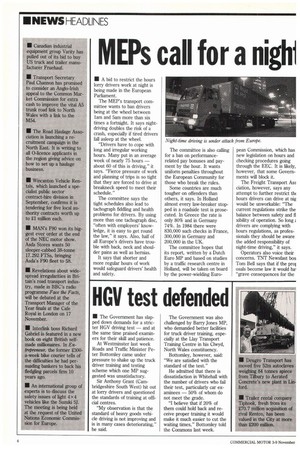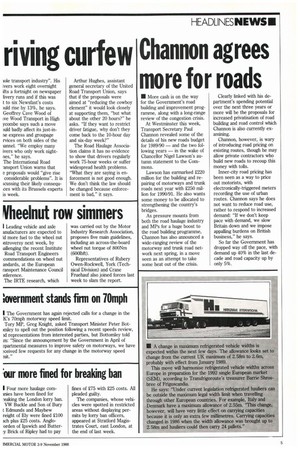MEPs call for a nighl riving curfew
Page 4

Page 5

If you've noticed an error in this article please click here to report it so we can fix it.
El A bid to restrict the hours lorry drivers work at night is being made in the European Parliament.
The MEP's transport committee wants to ban drivers being at the wheel between lam and 5am more than six times a fortnight. It says nightdriving doubles the risk of a crash, especially if tired drivers fall asleep at the wheel.
"Drivers have to cope with long and irregular working hours. Many put in an average week of nearly 75 hours — about 60 of this is driving," it says. "Fierce pressure of work and planning of trips is so tight that they are forced to drive at breakneck speed to meet their schedule."
The committee says the tight schedules also lead to tachograph fiddling and health problems for drivers. By using more than one tachograph disc, 'often with employers' knowledge, it is easy to get round the law," it says. Also, half of all Europe's drivers have trouble with back, neck and shoulder pains as well as hernias.
It says that shorter and more regular hours of work would safeguard drivers' health and safety. The committee is also calling for a ban on performancerelated pay bonuses and payment by the hour. It wants uniform penalties throughout the European Community for those who break the rules.
Some countries are much tougher on offenders than others, it says. In Holland almost every law-breaker stopped in a roadside test is prosecuted. In Greece the rate is only 80% and in Germany 74%. In 1984 there were 830,000 such checks in France, 300,000 in Germany and 200,000 in the UK.
The committee hopes that its report, written by a Dutch Euro MP and based on studies by a traffic research centre in Holland, will he taken on board by the power-wielding Euro pean Commission, which has new legislation on hours and checking procedures going through the EEC. It is likely, however, that some Governments will block it.
The Freight Transport Ass ciation, however, says any attempt to further restrict du hours drivers can drive at nig would be unworkable: "The current regulations strike the balance between safety and fl xibility of operation. So long drivers are complying with hours regulations, as professionals they should be aware the added responsibility of night-time driving," it says.
Operators also voice their concerns. TNT Newsfast bos Tom Bell says that if the prof osals become law it would ha' "grave consequences for the iole transport industry". His ivers work eight overnight ifts a fortnight on newspaper livery runs and if this was t to six Newsfast's costs )uld rise by 13%, he says. Geoffrey Cave Wood of we Wood Transport in High ycombe says such a move iuld badly affect its just-inse express and groupage rvices on both sides of the iannel. "We employ many ivers who only work nightnes," he says.
The International Road -ansport Union warns that e proposals would "give rise considerable problems". It is ;cussing their likely consequces with its Brussels experts is week. Arthur Hughes, assistant general secretary of the United Road Transport Union, says that if the proposals were aimed at "reducing the cowboy element" it would look closely at supporting them, "but what about the other 20 hours?" he asks. "If they want to restrict driver fatigue, why don't they come back to the 10-hour day and six-day week?"
The Road Haulage Association claims it has no evidence to show that drivers regularly work 75-hour weeks or suffer widespread health problems. "What they are saying is enforcement is not good enough. We don't think the law should be changed because enforcement is bad," it says.
























































